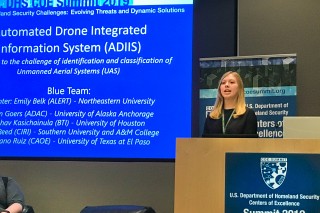News & Events
Industry
Emily Belk Wins DHS COE Summit Grand Challenge Competition September 26, 2019
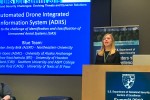
Computer Engineering and Computer Science BS student, Emily Belk was part of the winning team at the 2019 Department of Homeland Security (DHS) Centers of Excellence (COE) Summit Grand Challenge Student Competition held on July 31st at George Mason University in Arlington, Virginia. The DHS COE Summit is an annual event held to showcase the innovative research being conducted by the COE community as they work with industry partners and government collaborators and end-users to develop R&D tools and solutions to respond to the evolving threats and challenges facing the nation. Emily was attending the Summit as a student representative for the ALERT (Awareness and Localization of Explosives-Related Threats) COE led by Northeastern University and Director Michael B. Silevitch, Robert D. Black Professor in the Department of Electrical & Computer Engineering. Emily works as an undergraduate researcher on the ALERT project known as “Multi-Transmitter/Multi-Receiver Blade Beam Torus Reflector for Efficient Advanced Imaging Technology” led by ALERT Deputy Director, Professor Carey Rappaport.
The Grand Challenge Student Competition was designed to foster collaboration among the talented undergraduate and graduate students engaged in the research and work force development efforts within the COE community. Emily said, “The opportunity to work with students from different disciplines and centers of excellence to tackle the challenge at hand yielded many diverse and exciting ideas.”
With the goal of and emphasis on, developing innovative ways to approach homeland security concerns, diverse teams of multi-disciplinary COE students were formed to address this year’s Grand Challenge prompt which was to “identify an emerging threat to homeland security posed by Unmanned Aerial Systems (UAS) and develop a strategy to counter it. The student teams began brainstorming on the challenge on July 29thth and had to submit their final presentation and abstract by the evening of July 30th. “Having only 24 hours to define a problem, develop a solution, and create a presentation made for a very stimulating environment,” said Emily.
Emily led the final presentation for her team, including Tristan Goers from the University of Alaska Anchorage, Keshav Kasichainula from the University of Houston, Trinity Reed from Southern University and A&M College and Emiliano Ruiz from the University of Texas at El Paso which was entitled, “Automated Drone Integrated Information System (ADIIS).” ADIIS was envisioned to address the challenge in identifying and classifying UAS through a combination of registration incentives and tracking methods. An esteemed panel of judges, including leaders from DHS and industry, reviewed the presentations and selected Emily’s team, as the first place team of the five competing teams based on their innovative concept and articulate presentation.
“Our solution created a database that stored information about all drones flying in the U. S. airspace, and my favorite tool that we implemented was our Automated Point Evaluation System (APES). APES could calculate the perceived threat level of any drone”, said Emily. “We also implemented an APES precheck that, similar to TSA precheck, would allow trusted companies to purchase an initial stage of vetting in return for a more streamlined experience flying their commercial drones”.
Emily and her team received a first place certificate of recognition from William N. Bryan, Senior Official Performing the Duties of the Under Secretary for DHS S&T at the Grand Challenge Award Presentation and presented their winning proposal to the DHS Summit audience on August 1st.
ALERT Hosts Technology Showcase & ADSA20 Workshop May 29, 2019
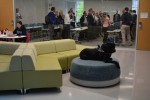
May 29, 2019
Earlier this month, the ALERT Center of Excellence hosted the ALERT Technology Showcase (May 14th) in conjunction with the ADSA20 Workshop (May 15th & 16th) at Northeastern University. The ALERT Technology Showcase featured presentations, posters, and technology demonstrations of the Center’s research and tools and highlighted the Center’s collaborative work with industry and government stakeholders, such as Astrophysics, Inc., DetectaChem, ENrG Inc., Pendar Technologies, Lawrence Livermore National Laboratory, Quadridox, Rapiscan Systems, Signature Sciences, and Smiths Detection, to name a few. The objective of the event was to demonstrate the transition of ALERT’s work to Department of Homeland Security components, such as the Transportation Security Administration and U.S. Customs and Border Protection, as well as its impact on the homeland security enterprise as a whole.
The twentieth workshop for Advanced Development for Security Applications (ADSA20) addressed the theme of “design, development, testing, deployment, and operation of effective systems.” Specific topics that were discussed during the workshop included: defining effective, effectiveness for stakeholders (airlines, passengers) and venues (subway, rail, cargo), humans in the loop, applications of metadata, rapid response to an adapting adversary, the role of artificial intelligence, and the transition of technology from academia to industry.
More than 160 attendees from academia, industry, and government participated in the ALERT Technology Showcase and ADSA20 Workshop, resulting in two of the most engaging events ALERT has hosted yet.
Regarding the value of the ALERT Technology Showcase, Francois Zayek, CEO of Astrophysics, Inc. stated
“I’m pleased to be here. I’m happy to see all the presentations, because again, we are so much involved in our industry. We are so much involved in the business, that we keep ourselves a little bit further away from the technologies, so every now and then it would be very helpful—and healthy—to come in and then see what is happening in the technology arena.”
Professor David Castañón (Boston University) and the lead for ALERT’s research on Video Analytics and Signature Analysis (Thrust R4), shared his thoughts on the most valuable aspect of the event stating
“It’s getting the feedback from a potential user. That is somebody who says ‘I have a problem this would be useful for.’ I’ve had two or three of those interactions while I have been here with the posters and it has been very nice.”
The next event ALERT will be hosting is the second workshop on Advanced Developments Encompassing Processes and Technologies for Customs and Border Protection (CBP-ADEPT-02), which will be held July 17th and 18th at Northeastern University. For more information on upcoming events and workshops, visit the ALERT website: www.northeastern.edu/alert
Photo: K9 Figaro waits patiently to participate in a demo of TEAS (Trace Explosives Aids for Scent), which ALERT developed in collaboration with DetectaChem, and showcased at the recent ALERT Technology Showcase as an example of safer training aids for explosives detection canines and first responders.
ALERT’s Newest Industrial Members: 908 Devices and Rigaku Analytical Devices May 29, 2019
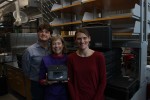
May 29, 2019
This spring, the ALERT Center of Excellence welcomed 908 Devices and Rigaku Analytical Devices as the Center’s newest industrial members thanks to their generous donations of equipment to further ALERT research efforts at the University of Rhode Island (URI).
908 Devices is a fast-growing business in Boston, Massachusetts that develops products ranging from rugged, handheld chemical detection tools to compact, tiny footprint analyzers and fast separation devices. These purpose-built and user-centric devices serve a range of industries including field forensics, oil and gas, life sciences, and other applied markets.
908 Devices donated twenty M908TM portable mass spectrometers to the Chemistry Department at URI to support the high school education programming run by Dr. Jimmie Oxley (ALERT Research Thrust 1 Lead) and Dr. James Smith (ALERT Education Program Co-Lead).The M908TM is the company’s first product based on their patented and proven high-pressure mass spectrometryTM. M908TM is currently being used by CBRNE and HAZMAT organizations around the world for chemical detection, with at least one M908TM device deployed in every state across the United States.
Rigaku Analytical Devices is a leading pioneer and innovator of handheld and portable spectroscopic analyzers for use in the protection of public health and safety, aid in the advancement of scientific and academic study, enable the recycle and reuse of metal alloys, and ensure quality of key metal alloy components in mission-critical industries. Their advanced and rugged products deliver unparalleled accuracy and extensive application support, empowering their customers to achieve rapid lab-like results any time, any place.
Rigaku Analytical Devices donated a KT-100STM alloy analyzer (handheld laser induced breakdown spectroscopy technology) to Dr. Oxley’s lab at URI.
ALERT industrial membership has several advantages. Through various events, ALERT provides members the opportunity to network with other industrial members, faculty from ALERT’s partner institutions, and representatives from local, state, and federal governments. Other advantages of ALERT industrial membership include admission to two exclusive members-only events: The Annual Student Pipeline Industry Roundtable Event (ASPIRE), which provides industrial members with access to qualified job-seeking students; and the ALERT Industrial Advisory Board meeting, which features engaging guest speakers, highlights of successful government-industry-academia collaboration, and networking opportunities. Members also have the opportunity to request targeted research in an area of interest to their organizations. As an added bonus, registration fees are waived for industrial members attending ALERT’s public workshops, such as the ADSA Workshop and CBP-ADEPT Workshop series.
For more information on the advantages of ALERT industrial membership, please see the Benefits of Collaboration, or contact our Industrial and Government Liaison Officer, Ms. Emel Bulat at [email protected], or our Industry Liaison Associate, Ms. Kristy Provinzano at [email protected].
Rigaku Analytical Devices: ALERT’s Newest Industrial Member May 7, 2019
May 9, 2019
ALERT is pleased to welcome Rigaku Analytical Devices as its newest industrial member thanks to their donation of a KT-100S alloy analyzer (handheld LIBS technology) to Dr. Jimmie Oxley (ALERT Research Thrust 1 Lead) at the University of Rhode Island.
Rigaku Analytical Devices is a leading pioneer and innovator of handheld and portable spectroscopic analyzers for use in the protection of public health and safety, aid in the advancement of scientific and academic study, enable the recycle and reuse of metal alloys, and ensure quality of key metal alloy components in mission-critical industries. Their advanced and rugged products deliver unparalleled accuracy and extensive application support, empowering their customers to achieve rapid lab-like results any time, any place.
ALERT industrial membership has several advantages. Through various events, ALERT provides members the opportunity to network with other industrial members, faculty from ALERT’s partner institutions, and representative from local, state, and federal governments. Other advantages of ALERT industrial membership include admission to two exclusive members-only events: The Annual Student Pipeline Industry Roundtable Event (ASPIRE), which provides industrial members with access to qualified job-seeking students; and the ALERT Industrial Advisory Board meeting, which features engaging guest speakers, highlights of successful government-industry-academia collaboration, and networking opportunities. Members also have the opportunity to request targeted research in an area of interest to their organizations. As an added bonus, registration fees are waived for industrial members attending ALERT’s public workshops, such as the ADSA Workshop and CBP-ADEPT Workshop series.
For more advantages of ALERT industrial membership, please see the Benefits of Collaboration, or contact our Industrial and Government Liaison Officer, Ms. Emel Bulat at [email protected], or Ms. Kristy Provinzano at [email protected].
908 Devices: ALERT’s Newest Industrial Member April 8, 2019

March 28, 2019
ALERT is pleased to welcome 908 Devices as its newest industrial member thanks to their generous donation of 20 M908TM portable mass spectrometers to the University of Rhode Island Chemistry Department to support the high school education programming run by Dr. Jimmie Oxley (ALERT Research Thrust 1 Lead) and Dr. James Smith (ALERT Education Program Co-Lead).
908 Devices is a fast-growing business in Boston, Massachusetts that develops products ranging from rugged, handheld chemical detection tools to compact, tiny footprint analyzers and fast separation devices. These purpose-built and user-centric devices serve a range of industries including field forensics, oil and gas, life sciences, and other applied markets. The M908 is the company’s first product based on their patented and proven high-pressure mass spectrometryTM. . M908 is currently being used by CBRNE and HAZMAT organizations around the world for chemical detection, with at least one M908 device deployed in every state across the United States.
ALERT industrial membership has several advantages. Through various events, ALERT provides members the opportunity to network with other industrial members, faculty from ALERT’s partner institutions, and representative from local, state, and federal governments. Other advantages of ALERT industrial membership include admission to two exclusive members-only events: The Annual Student Pipeline Industry Roundtable Event (ASPIRE), which provides industrial members with access to qualified job-seeking students; and the ALERT Industrial Advisory Board meeting, which features engaging guest speakers, highlights of successful government-industry-academia collaboration, and networking opportunities. Members also have the opportunity to request targeted research in an area of interest to their organizations. As an added bonus, registration fees are waived for industrial members attending ALERT’s public workshops, such as the ADSA Workshop and CBP-ADEPT Workshop series.
For more advantages of ALERT industrial membership, please see the Benefits of Collaboration, or contact our Industrial and Government Liaison Officer, Ms. Emel Bulat at [email protected], or Ms. Kristy Provinzano at [email protected].
Making Connections at ASPIRE 2019 March 27, 2019

March 28, 2019
This week, STEM students from ALERT’s academic partner institutions, and representatives from ALERT’s Industrial Members and government collaborators gathered together at Northeastern University for the Annual Student Pipeline Industry Roundtable Event (ASPIRE 2019). The aim of the ASPIRE series is to connect members of the industrial and government communities with qualified STEM students looking for internships, co-ops, and full-time jobs related to homeland security.
ASPIRE 2019 kicked off with welcoming remarks from Michael Silevitch (Director, ALERT), Emel Bulat (Senior Consultant for Corporate & Government Partnerships, ALERT), and Kristy Provinzano (Industry Liaison Associate, ALERT). Following this, ALERT Industry Members (American Science & Engineering, Rapiscan Systems, Raytheon, Smiths Detection) and representatives from the Department of Homeland Security and the U.S. Customs & Border Protection introduced student career opportunities at their respective organizations.
According to Adam Hutter, Laboratory Director at U.S. Customs and Border Protection’s New York Laboratory, “We’re constantly hiring, so we want to make sure we’re bringing in the best talent we can. The Department of Homeland Security has already invested heavily in these students through the Centers of Excellence pipeline, so it’s a resource we should utilize. These students have a leg up, because they’re already working on homeland security problems.”
ASPIRE 2019 featured both group and one-on-one meetings between students and representatives from industry and government. Many of the participants, like Jose Ruiz-Caballero who works on ALERT Project R3-C at the University of Puerto Rico Mayaguez, were ASPIRE returnees interested in jobs: “It’s a high impact event from my professional point of view, because you have direct contact with industry and government and they can provide you with a profile of what they’re looking for in a candidate.”
Molly Baldwin, a Purdue University undergraduate who works on ALERT Project R2-A.3 and is about to graduate is looking toward the future: “I started working on the research project last semester and fell in love with this industry. I’m here to see what jobs are out there for chemical engineers. I could see myself continuing to do research to improve the detection of explosives.”
For other students, the event is a great networking opportunity and a chance to gain experience speaking with job recruiters. First year student and first time ASPIRE attendee, Ian Hay, who does breast cancer detection research at Northeastern University, isn’t looking for a job quite yet, but found the event to be beneficial. According to Hay, “Communicating with different companies, both public and private, is valuable to me, especially in a low-pressure setting. Being able to meet with representatives and explain my work and how it applies to their industry is great practice.”
Since its establishment as a DHS Center of Excellence, ALERT has prioritized training the next generation of professionals to tackle explosives-related threats. Over the past 12 years, ALERT has trained over 160 graduate students, resulting in more than 100 of these professionals working in DHS-relevant fields. Events like ASPIRE 2019 are a significant part of ALERT’s mission to provide educational development to improve effective characterization, detection, mitigation and response to explosives-related threats facing the nation and the world.
Spring 2019: Upcoming ALERT Events November 29, 2018

Annual Student Pipeline Industry Roundtable Event (ASPIRE)
March 26, 2019
The Annual Student Pipeline Industry Roundtable Event (ASPIRE) will be held on March 26, 2019 at Northeastern University (Boston, MA). The ASPIRE is hosted by ALERT (Awareness and Localization of Explosives-Related Threats) & Gordon-CenSSIS (The Bernard M. Gordon Center for Subsurface Sensing and Imaging Systems). ASPIRE provides an optimal setting for dialogue between members of the academic, industrial, and government communities and also provides networking opportunities for students looking for internships, co-op experiences, and full-time jobs. ASPIRE is targeted at undergraduate and graduate students in the fields of engineering, science, and computer & information sciences who are interested in careers related to homeland security.
ALERT Technology Showcase and Research Review
May 14, 2019
ALERT will be hosting a Technology Showcase and Research Review on May 14, 2019 at Northeastern University (Boston, MA). This event will feature presentations and demonstrations of ALERT research results and tools from select ALERT projects. Attendees will also be able to interact with individual project researchers and collaborators to learn more about their research throughout the day.
Advanced Developments for Security Applications (ADSA20) Workshop
May 15-16, 2019
The twentieth Advanced Developments for Security Applications (ADSA20) Workshop will be held May 15-16, 2019 at Northeastern University (Boston, MA). Due to conflicts with other events, ALERT has changed the date previously provided. The theme of the workshop will be “Design, Development, Testing, Deployment and Operation of Effective Systems.” Topics that will be addressed include:
- Defining “effective”
- Effectiveness for other stakeholders: airlines and passengers
- Effectiveness for other venues: subway, rail, and cargo
- Human in the loop
- Positive predictive value improvement
- Detection versus deterrence versus displacement
- Role of interconnectivity with open architectures
- Correct operating point on the receiver operator characteristic curve
- Application of metadata
- Rapid response to an adapting adversary
- Managing the threat list
- Dealing with imperfect equipment
- Role of Artificial Intelligence
- Statistical significance of tests and influence of limited training data
- Application of simulants
- True versus auto-detection
- Data augmentation
- Transition – particularly from academia
- Reducing time to market
- Role of third parties
A formal invitation to register for the ADSA20 Workshop and the ALERT Technology Showcase and Research Review, along with the agenda and logistics information are forthcoming. These events are by invitation only. Please contact Tiffany Lam at [email protected] if you are interested in attending.
Advanced Developments Encompassing Processes and Technologies for Customs and Border Protection (CBP-ADEPT-02)
July 17-18, 2019
The second workshop on Advanced Developments Encompassing Processes and Technologies for Customs and Border Protection (CBP-ADEPT-02) will be held July 17-18, 2019 at Northeastern University (Boston, MA). The CBP-ADEPT-02 Workshop will address advanced development and processes for tomorrow with presentations and panel discussions on specific topics, such as:
- An adaptive adversary
- Integration of equipment and data
- Collection and use of meta-data
- Deterrence/hardening
- Insider threats
- Con-Ops
- Adaptation of TSA technologies
- Economics – incentives
- Simulation tools
- War gaming applications
A formal invitation to register for the event, along with the agenda and logistics information is forthcoming. You can find more information about the CBP-ADEPT workshops in the following link: https://alert.northeastern.edu/transitioning-technology/cbpadept/
Highlights from the 2018 Industrial Advisory Board Meeting November 29, 2018
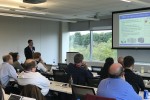
ALERT held its annual Industrial Advisory Board (IAB) Meeting at the Kostas Research Institute for Homeland Security in Burlington, MA on October 15th. The agenda attracted many of ALERT’s Industrial members, representatives from ALERT’s DHS Office of University Program (OUP) customers, and members of the Department of Homeland Security (DHS) Science and Technology Directorate (S&T).
The agenda included welcoming remarks from Peter Boynton, the CEO of the Kostas Research Institute; presentations from two ALERT Industrial Members and two ALERT researchers; an IAB retrospective discussion; a tour of the ALERT Video Analytics Laboratory; a student poster session; and a networking reception. Presentations at the event included:
- Overview: NEU Master’s Degree & Certificate in Homeland Security, Jack McDevitt, Director, Institute on Race and Justice, Professor of the Practice, School of Criminology and Criminal Justice, Northeastern University
- Utilizing Guardian Centers for R&D, Doug Lang, VP Business Development, CBRNE-WMD, Guardian Centers, LLC
- Standoff Trace Detection, Anthony Hoffman, Associate Professor, University of Notre Dame
- The Role of Texturing X-ray Diffraction Tomography, Joel Greenberg, Assistant Research Professor, Duke University
- Making the most of ALERT Membership, Dan Strellis, Sr. Director, R&D, Rapiscan Laboratories
- IAB Retrospective Group Discussion, Facilitated by Emel Bulat and Kristy Provinzano, ALERT Industry Liaison Office, Northeastern University
Common discussion topics throughout the event included technology maturation, testing in realistic environments, and technology transition. The presentations and subsequent discussion connected industrial members with one another, as well as members of DHS S&T, resulting in plans to continue discussions and potentially collaborate in the future to support technology maturation and transition.
ALERT’s annual IAB Meeting and other members-only events provide industrial members with the opportunity to network with other industrial members, faculty from ALERT’s partner institutions, and representatives from local, state, and federal government institutions. Other advantages of ALERT industrial membership include admission to the Annual Student Pipeline Industry Roundtable Event (ASPIRE), providing industrial members with access to qualified job-seeking students; the opportunity to request targeted research in an area of interest to their organizations; and waivers of ALERT workshop registration fees.
For more advantages of ALERT industrial membership, please see the Benefits of Collaboration, or contact our Industrial and Government Liaison Officers, Ms. Kristy Provinzano at [email protected], or Ms. Emel Bulat at [email protected].
ADSA19 Workshop Brings Academia, Industry, and Government Together November 29, 2018

The Nineteenth Advanced Development for Security Applications (ADSA19) Workshop occurred on October 16-17, 2018 at Northeastern University in Boston, MA. Close to 150 participants from academia, industry, and government gathered to engage in dialogue related to the theme of the workshop: “Rapid Response to an Adapting Adversary.”
Over the course of two days, subject matter experts and leaders from the Homeland Security Enterprise delivered presentations and participated in panel discussions on the topic of collecting and using metadata. Specific topics discussed included:
- Characterization of emerging threats
- Development and deployment of automated threat recognition (ATR) algorithms
- Metrics for assessing adaptability
- Operator involvement
- Third-parties, open-architectures
- Fused algorithms and systems
- Deterrence and dynamics systems
- Machine learning, simulants and simulated datasets
- Networking and cybersecurity
- Displacement
- Detecting the terrorist versus the threat
- Risk based screening using video tracking of passengers and divested objects
- Biometrics
- Air cargo
- Automation of concept of operations (automated screening lanes)
- Checkpoint CT and prohibited items
The next ADSA Workshop (ADSA20) will be held at the same location on May 15-16, 2019. The theme of the workshop will be “Design, Development, Testing, Deployment and Operation of Effective Systems.” ADSA20 is expected to continue to draw interested and engaged communities from the Homeland Security Enterprise.
The ADSA Workshop series has been convened by the DHS Center of Excellence (COE) for Awareness and Localization of Explosives-Related Threats (ALERT) since 2009. Originally named the “Algorithm Development for Security Applications” Workshop series, the name was changed following ADSA10 in 2014 to reflect how the scope of the workshop series has expanded well beyond algorithms. The ADSA Workshop series is intended to address research opportunities that may enable the development of next-generation systems and to facilitate collaboration and innovation between researchers from academia, national labs, and industry.
Presentations from the ADSA19 Workshop are available for viewing online: https://alert.northeastern.edu/transitioning-technology/adsa/final-reports-and-presentations/adsa19-presentations/
Final reports for previous ADSA Workshops are also available online: https://alert.northeastern.edu/transitioning-technology/adsa/final-reports-and-presentations/
ALERT Leads Trace Detection Seminar for Industrial Partner September 27, 2018

September 27, 2018
ALERT Thrust R2 Lead, Dr. Steve Beaudoin (Purdue University) led a seminar on Trace Detection at Rapiscan Systems, an OSI Systems Company, in Andover, Massachusetts on August 17, 2018. Rapiscan Systems, an ALERT Industrial Partner, specializes in providing state-of-the-art products, solutions, and services to meet the threat detection needs at airports, border crossings, railway stations, government and military installations, and high-risk facilities around the world.
Under the ALERT Industrial Partnership model, Industrial Partners can select one or more ways to allocate their membership fees. One of those options is a full-day seminar on a topic of the Industrial Partner’s choice and relevant to one of ALERT’s four research thrusts.
Dr. Beaudoin spent the morning with about 15-20 Rapiscan employees, interns, and co-op students from several disciplines. During this time, he gave a 2-hour (10:00am-12:00pm) lecture style presentation on Trace Detection covering three topics of interest: particulate explosives, compound explosives, and the TESSA Project – Contact Sampling Study. Participants had the opportunity to ask questions during the presentation, and after lunch, there were several more hours of Q&A and discussion (ending at 4:00pm). Several collaboration opportunities were discussed throughout the day, as well as several ways in which the two organizations can support one another’s work.
The feedback throughout the day, from several Rapiscan employees, was very positive and was followed by a request for more seminars in the future. Dr. Beaudoin’s contact sampling project report and seminar presentation was disseminated to the Rapiscan team as a resource.
According to Stefan Lukow, Ph.D., Director of Research and Development at Rapiscan Systems, “The seminar last Friday was very well received by many members of my R&D group as well as the greater engineering team. Throughout Steve’s presentation, there were many discussions and also ideas spurred for potential collaboration or suggestions for future work to be done by either side. It was informative and took the tone of a discussion rather than a lecture. Following the presentations, Steve made himself available for additional discussion with the engineering team for more in-depth discussions and several took him up on this offer. Overall, it was greatly beneficial to have Steve present his work and that of the ALERT center. I hope for more opportunities in the near future.”
For more information about ALERT’s customizable Industrial Partnerships and benefits of partnering with ALERT, please visit the ALERT Website or email Emel Bulat (Industrial and Government Liaison Officer) or Kristy Provinzano (Industry Liaison Associate).
Photo caption: Low-resolution scanning electron microscope image of freestanding micro-patterned traps used during contact sampling

